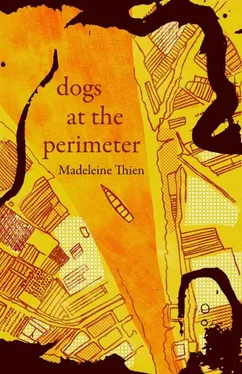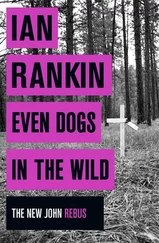“Feel my hands,” my brother said one morning, nearly crying. “See how they’re breaking.” We were working together in the garden.
His hands were scratched and rough.
“You’re imagining things,” I told him. “They’re just the same as always.”
“If we had a gun,” my brother said, “we could have all the food we wanted. If I had a rope …”
“Then what?”
Sopham wiped the sweat and tears from his face. After a moment, he said, “If Kosal could give you anything, what would you ask for?”
The sun was crawling up. In the fullness of a banana tree, I saw a figure reaching up into the leaves, trying to grasp the fruit, mistaking it for the sun. The picture, hallucinatory, swam in the air.
“Ask for something you can use,” he said thoughtfully. “It’s no good asking for the impossible.”
But we had a home, I thought, a life. Why should we be ashamed? Kosal’s world was the dream, I knew. Soon we would open our eyes and all of this would cease to be. I saw my father laughing, his stories like a page turning. I closed my eyes and willed him to keep walking, to come nearer.
I heard my brother’s voice. “Ask to be a mulatan , and not one of us. The mulatan always have enough. They have food they can’t even finish.”
In small groups, the older children were sent away. The driver and his wife, the machinist and two of his boys, became sick and died. The students, the teachers, the banker, they vanished. If a family asked for a missing person, Kosal answered them by saying, “I don’t know who you mean. I don’t know this person.” He had a cunning, dry expression in his eyes. He spoke slowly as if his words held threads of gold, he spoke softly and we had to lean in close to hear. “Why do you worry?” he would ask, a smile shading his face. “ At oy té .”
One night, we were called to a meeting. Kosal stood before us. An old man, the hotel manager, knelt on the ground.
“Tell us,” Kosal said.
I saw sweat gleaming on the man’s face. He said, “What would you have me say, Teacher?”
“Tell us about your life.”
The old man stared up, uncomprehending.
Beside them, the teenager, Prasith, carried a length of rope hung diagonally across his chest, worn like an ammunition belt. He handled the rope in his hands obsessively, fitfully, winding the end around one wrist, letting it fall slack, then taking it up again. The old man begged forgiveness. “You were happy then, weren’t you?” Kosal said, interrupting him. “In the old society.” There was a tokoe , a gecko on the wall clicking and clicking. “You think you’re suffering now,” Kosal said. He spoke as if he were feverish and light and faultless. “You think you understand, but what do you know about pain? I had to add everything together. There was a cost to your happiness.” My mother tried to turn our faces away but Kosal rebuked her in his smooth, begging voice. He told us to pay attention, to learn from this man’s example. He said that we must make ourselves strong and self-sufficient, we must never rely on anyone else, we must be clean inside because purity was strength. He said, “If your life brings us nothing, why should we not obliterate you?”
In front of us, the old man tried to crawl free. He swung his head away to shield himself, from Prasith and from all the watching eyes.
I wanted to block out the sound that his throat made, the panic in his hands. “Don’t be afraid, mit ,” the teenager said, touching the old man’s head, his face. “The earth is quiet. It will bring you quiet. Everything is only beginning again.”
My mother came back with her eyes alight and her hands shaking. She had a plan, she told us. The time had come to run away. We were to be reunited with our father. “Phnom Penh,” she said. “Norodom Boulevard. Of course he’s there.”
The world was upside down. I wanted to tell her there was no Phnom Penh, no Norodom, but it was like speaking to my father on those days when he couldn’t hear us, his drinking had turned the volume down low. We were the sun going down, we were nothing but projections of light on the wall.
“Escape to where?” my brother said gently. “Escape to what?”
Feverish, my mother held her hands over her ears. Her body was both skeletal and swollen.
“He’s been asking for you,” she said. “Father has the plane tickets already. The flight. We’ll go through Bangkok. See the water, see how it’s receding?” She turned to me. “Terrible girl. Why do you blame your father? They sent him to study. They know his worth.”
All night, my mother cried and twisted on the ground. Her legs were tender, bloated with water, she needed food, she needed vitamins, but all those things had vanished as if they’d never been. Kosal gave us medicine but the strange black pills dissolved on her tongue like charcoal.
“Ma,” I whispered. “They’re listening.”
My brother stroked her hands. “She doesn’t know us.”
She lay between us, feverish, laughing.
The stars were everywhere. My father came and knocked at the door, repeating my name like an incantation. From room to room, I ran, turning my back on him. I walked through the hallways, I found the staircase that led to the rooftop. My father was there waiting for me. He held my hand and pulled me through a window and into a hidden space. He was covered in dust, it slid into the air, it coated everything. I lay my father down. There were pills everywhere, in his hands, tumbling out of his pockets, cascading down and skittering along the floor, a thousand riels for a cupful , I remember, a thousand riels, sometimes less. The boys playing kick sandal by the riverside, the cyclo drivers asleep in their vehicles. Endless colour and movement, a wonder before my eyes. “Are we going home now, Pak? I’m hungry and the moon is already out.” His eyes were open. I filled this room with the names of books I remembered, I saw them on the thin, hard spines, floating on typeset pages, the texts of the Tipitaka , the Buddhist cannon, books by Alexandre Dumas, novels of Hak Chhay Hok and Khun Srun, I read their titles on clean sheets of paper that were rolled into the little typewriter my father had given me. My friends laughing when I had told them, puffed up like a tiger, that my father had given me this clattering machine, this grown-up beauty, something of my own.
“If I leave you,” I asked him, “where will I go?”
“My sweet, you can never travel far enough.”
Along the pitted road a truck came, churning up the ground with its thick tires. A beam of light advanced across the huts but I lay close to the earth, inside the darkness. Beside me, our friend, Oun, the dentist’s son, was reciting verses in Pali, I could hear the running of sound: There are trees bearing perpetual fruit, on these trees there are multitudes of birds. There also is heard the cry of peacocks and herons, and the melodious song of kokilas. There near the lake, the cry of birds who call, Live ye, Live ye. The birds roam the woods … Passages he had memorized in school, just as we had done. Words pushed out of his mind, they floated down on us like air.
“My son, my son,” his father said.
Oun’s voice fell silent, he moaned as if trying to reel the sentences back in again.
His father said, “Angkar is listening.”
There were spies, chhlop , everywhere. They came and waited in the darkness.
I fell asleep and became a small child again. I saw Wat Langka, its tiled rooftops, its rising eaves, stupas in the courtyard, the stone undulations of the Naga at the foot of the stairs. These were the forms that had coloured my earliest dreams. When my grandmother died, the monks had written her name on a slip of paper. They had set the words alight, watching the paper coil and burn, becoming ash inside a golden bowl. In the bright heat of morning, the monks’ voices had risen through the air, arcing up against the temple walls.
Читать дальше












